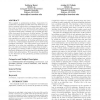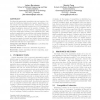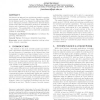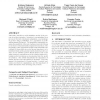101
Voted
GECCO
2005
Springer
15 years 6 months ago
2005
Springer
When applied to optimization problems, Cooperative Coevolutionary Algorithms (CCEA) have been observed to exhibit a behavior called relative overgeneralization. Roughly, they tend...
105
Voted
GECCO
2005
Springer
15 years 6 months ago
2005
Springer
Deciding the appropriate population size and number of islands for distributed island-model genetic algorithms is often critical to the algorithm’s success. This paper outlines ...
GECCO
2005
Springer
15 years 6 months ago
2005
Springer
The Internet is different from traditional parallel computing environments, and Distributed Genetic Algorithms (DGAs) for the Internet need to be designed to address these diffe...
GECCO
2005
Springer
15 years 6 months ago
2005
Springer
GECCO
2005
Springer
15 years 6 months ago
2005
Springer
Reactive real-time systems have to react to external events within time constraints: Triggered tasks must execute within deadlines. The goal of this article is to automate, based ...
GECCO
2005
Springer
15 years 6 months ago
2005
Springer
Although the interest in nature-inspired optimization of dynamic problems has been growing constantly over the past decade, very little has been done to analyze and characterize a...
115
Voted
GECCO
2005
Springer
15 years 6 months ago
2005
Springer
During the optimization of a constrained problem using evolutionary algorithms (EAs), an individual in the population can be described using three important properties, i.e., obje...
100
Voted
GECCO
2005
Springer
15 years 6 months ago
2005
Springer
A Quasi-Monte-Carlo method based on the computation of a surrogate model of the fitness function is proposed, and its convergence at super-linear rate 3/2 is proved under rather ...
GECCO
2005
Springer
15 years 6 months ago
2005
Springer
100
Voted
GECCO
2005
Springer
15 years 6 months ago
2005
Springer
The iterated prisoner’s dilemma is a widely used computational model of cooperation and conflict. Many studies report emergent cooperation in populations of agents trained to p...




